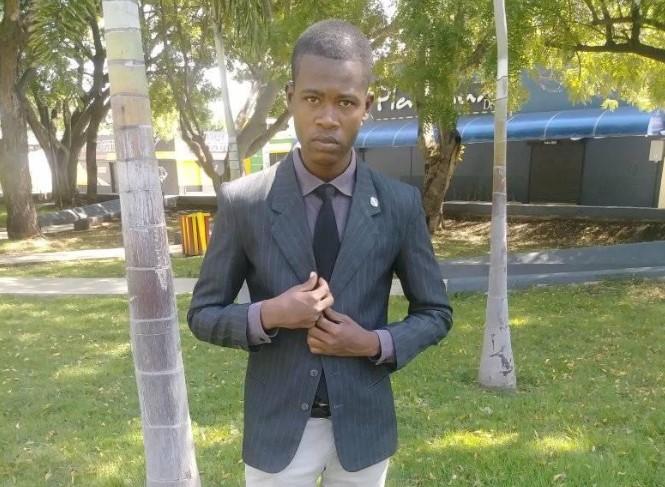How are LGBT Haitians coping with political instability and violence?
Moïse Manoël-Florisse, is an African-Caribbean online journalist keeping an eye…
Haiti has been described as the pearl of the Antilles, but ongoing political instability, gang violence, lawlessness, and poverty have made life increasingly precarious for its 11 million citizens, including its LGBTQ citizens.
Three years after the tragic and brutal death of Haitian LGBT rights activist Charlot Jeudy, 76crimes met with Steeve Grand-Jean from Cap-Haitien, who coordinates the human rights advocacy group Autonome pour l’Inclusion et l’Émancipation Sociale (AIES), to find out how the situation has evolved on the ground.

Tell us about yourself?
Steeve Grand-Jean: I am 33 years old and I come from the world of journalism and radio animation. I come from the city of Cap-Haitien, the second largest city in the country and I am part of the LGBTI communities. What first caught my attention was the lack of space for deliberation and the often Manichean vision that accompanies public debate on societal issues. It is to educate my people about these misconceptions that I founded AIES.
Three years after the assassination of Charlot Jeudy, what is the situation in Haiti?
In Haiti, we must fight and struggle to obtain everything that is simple and essential elsewhere in the world. The main cause is insecurity, violence and crime. It is mainly Port-au-Prince, the capital, that is affected. The population lives under the control of gangs and cartels that fight each other for the resources of the neighborhoods they control. The population lives a life on borrowed time between stray bullets, while from time to time, there are reports of massacres perpetrated against civilians on the outskirts of the city. The daily life of the inhabitants is punctuated by shortages and deficiencies: lack of water, electricity, fuel. The result is the destruction of the economic and social fabric and increasingly perilous travel. Fortunately, in the other major cities of the country, the situation is different. However, it is the entire ecosystem of human rights organizations that is impacted by this violence. Indeed, if our bodies are riddled with bullets or burned, how can we help vulnerable communities?
Do you know any LGBTI people who have joined gangs?
I’m not involved in organized crime at all, so I can’t answer that, but it’s a tough question.
How do you deal with this situation in your organization?
Founded in 2018, AIES makes citizenship education the backbone of its human rights work. Within this framework, we naturally focus on LGBTphobic discrimination issues. Concerning the difficulties encountered, there are those that we cannot do anything about: administrative slowness to register, costs of the various procedures to accelerate the registration. Finally, there are difficulties that we can do something about, especially when it comes to the safety of our members or speakers during workshops: providing safe travel and accommodation, close to the place where the seminars take place. Of course, this entails additional costs, but the lives of the participants cannot be jeopardized.
Can you tell us about your background?
I grew up in a family of Jehovah’s Witnesses and I was excommunicated because of my homosexuality following a love affair with another boy in the congregation. At the time, I was a teenager. Following this exclusion, while the Church represented all my reference points, I had to rebuild myself for a long time. It is also to allow my peers to be supported in such trials that I founded AIES. However, even today, the memory of the evening following the announcement of my excommunication haunts me. In particular, the memory of my parents and relatives who were sobbing together at the time. In general, Jehovah’s Witnesses are one of the strictest branches of Protestantism: no going out with “the worldly,” no carnivals, no birthdays, and no premarital sex.
How do you see the future?
In view of the difficulties we face, we are fortunate to be supported by institutions that believe in us and in our ability to transform mentalities. Otherwise, it would have been much more difficult for us to organize colloquiums, meetings or even working seminars.
If you wish to support AIES, you can write and leave a message at the following email address: autonomeinfos2018@gmail.com.
Related articles about Haiti :
- Homophobic lies go viral on Twitter in Haiti (76crimes.com, May 11, 2022)
- U.S. envoy who challenged anti-gay Zambia now protests vs. U.S. in Haiti (76crimes.com, Sept 23, 2021)
- Fund drive supports LGBTQI Haitians hard hit by earthquake (76crimes.com, Sept 6, 2021)
- More of 76crimes.com’s reporting on Haiti
Related articles on the rest of the French-speaking Caribbean:
- Guadeloupe: LGBT support, LGBTphobia, picture-perfect scenery (May 18, 2022, 76crimes.com)
- Protests greet homophobic TV interview in Martinique (April 28, 2022, 76crimes.com)
- French Guiana: “500 euros, the price of my life!” (April 25, 2022, 76crimes.com)
- Interfaith activists rebut Guadeloupe claim that homosexuality is an illness (April 12, 2022, 76crimes.com)
- Near-homicidal homophobia: Death threats target our journalist (April 12, 2021, 76crimes.com)
- Saint-Martin: the vulnerability of LGBTI people to global warming (February 24, 2021, 76crimes.com)




